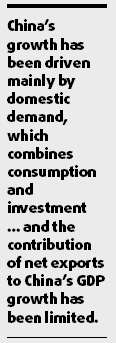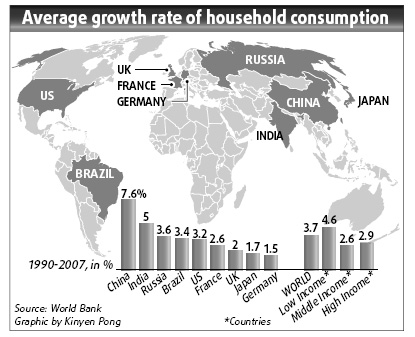Opinion
Lu explodes myths of China's growth
By Yang Ning and Wen Jia (China Daily)
Updated: 2010-01-07 07:52
 |
Large Medium Small |
'Consumers elevate spending'

A renowned economist who has won a number of top domestic prizes in economic research, Lu has always pursued "objective, cool-headed, fair, and scientific" research and endevored to help the country achieve healthy economic development instead of fanning trendy sayings to woo the public.
Unlike many economists who think China's consumption lacks vitality and its consumers have not loosened their purse strings enough to help the world economy, Lu says the opposite is true.
"Chinese consumers have kept increasing their spending They are elevating their consumption to a much higher and far costlier level, which is conducive to economic growth."
Forty years ago, when Lu joined a national campaign for young intellectuals to be an agricultural worker on a farm in Heilongjiang province after leaving his Beijing home, even a radio was a luxury for a Chinese.
Thirty years ago, when economic reform began in earnest and he became one of the first groups of college students, the best buys were bikes and watches. Twenty years ago, when Lu got his doctoral degree in economics from the CPC Central Party School, color TV sets and refrigerators were considered the best of consumer products.
Ten years ago, when he started work at the State Council's Development Research Center, people were shopping for mobile phones and computers. Today, Chinese consumers are buying cars and houses. And yet some economists say Chinese do not spend.
Chinese consumers bought about 13 million vehicles last year - the highest in the world. And sales in the real estate sector rose by as much as 35 percent in the first three quarters of the year.
"Remember," Lu says, "a Chinese consumer has to spend about 100,000 yuan ($14,646.22) for a car and about 1 million yuan to buy an apartment."
Ordinary Chinese need to save for years or decades to fish out such huge amounts. They have to save just to pay the installments. "How can one still say China's consumption lacks vitality?"
Some multinationals, however, have accepted the truth. At a recent forum, Lu was told by executives of some multinationals that they were not only increasing their input in marketing in China, but also in research and development. The reason: rise in the level of consumption.
Further increase in China's domestic demand, Lu says, depends on how fast consumers' incomes grow. He believes China's economic growth is sustainable and accordingly it will expand the job market, especially in the emerging cultural, healthcare and environment sectors.
But what happens to the migrant workers who have lost their jobs in the coastal areas? Lu says they could be relocated to small- and medium-sized cities in the country's inner provinces to propel the urbanization drive.
'Sound balance for growth'
China has seen a generally sound balance among consumption, investment and net exports between 2004 and 2007 in its domestic growth.
Last year, however, investment's contribution to economic growth is likely to have already outpaced consumption due to the country's 4-trillion-yuan ($585.6 billion) stimulus package. But a large portion of the 1.8 trillion yuan ($263.6 billion) allotted by the central government has gone to residential housing projects for the lower-income groups.
Another part of the package has gone into ecological construction, water conservancy and pollution-control projects. "The input in infrastructure is far less than 80 percent as claimed by many," Lu says. "And the more the investment in technological development, the better."
For the whole of 2009, "investment and consumption have made up for the loss of net exports in driving recovery," he says.
As an adviser to China's top policymakers, Lu focuses on sustainable economic growth rather than academic awards.
"The inner developing need of the economy demands that its investment rate maintains a fast pace in the long term because China's industrialization will not be complete until the 2030s," he says.
His study of transitional economies as a visiting post-graduate at Oxford University and a short-term program at Harvard University have broadened his insight, but unlike the UK or the US, China has to deal with a large population, many of who are still poor.
Yet "China still has a lot of room to maneuver in its urbanization drive", because its urbanization rate, according to the World Bank, was 42.2 percent in 2007, compared to Brazil's 85.1 percent and Indonesia's 50.3 percent.
The accelerated urbanization process will be seen not only in the increase in the urban population, but also in the country's massive accumulation of fixed assets and infrastructure construction. All these will provide a strong material foundation for growth.
"As industrialization and urbani-zation both speed up and more residential units are sold, domestic demand will push economic growth in the future," Lu says.










